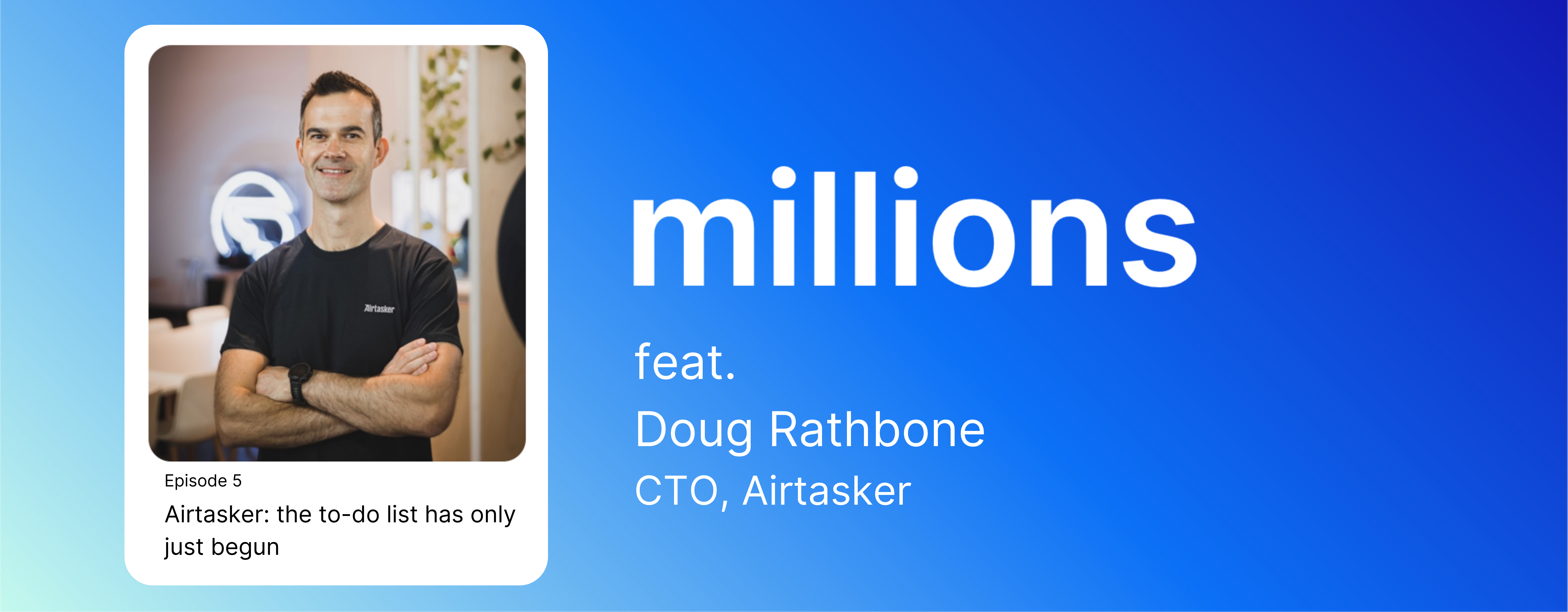Meet Doug Rathbone

Doug has had an exciting career journey to becoming CTO of Airtasker, with a background across a range of disciplines and more recently in several leadership roles at Amazon. Kicking off the discussion, he touched on his work leading up to this point.
“I’ve been in software development for a little over 20 years in a range of roles from digital marketing, cloud services, and a range of SaaS and marketplace products more recently. And before Airtasker, I worked at Amazon in Seattle, where I built out and led organisations responsible for decent parts of amazon.com and then more recently in Alexa.”
“One of the big things I think I took away from my time at Amazon is a really strong sense of it being everyone’s job to care about our customers or our users and to think more strategically about the business and product.”
A personal introduction to Airtasker
The focus on caring for customers and making their life easier is the bedrock of Airtasker – a company dedicated to filling skills gaps for everyday tasks.
When asked how his role at Airtasker came to be, Doug shares his personal story of hardship during COVID-19.
“During the beginning of the COVID pandemic around early 2020 I was living and working in Seattle and sadly my dad became quite ill and had a stroke. Obviously that was big news for me and my family. For me being remote, even bigger news. For those who aren’t aware, during that time the Australian borders were closed. Immigration and mercy flights were really only available to dignitaries, maybe controversially the odd sports star or celebrity. And that meant that trying to help my family remotely was quite challenging.”
“I needed to get help for my dad for things like groceries and shopping. I posted on Airtasker, a pretty vague task description saying and within a couple of hours I had a number of people coming back making some offers. They all seemed like they were really engaged in trying to help me with my needs and that I guess cemented my trust in the marketplace.”
“Then fast forward about six months after that and my wife and I decided to move back to Australia. Airtasker had a VP of engineering role open at the time and I guess the rest, as they say, is history.”
The role of AI at Airtasker
With rapid growth of the company comes the need for automated processes. Airtasker has used AI to improve the customer experience and ensure tasker operations run smoothly.
Doug shares “We automate things like the moderation of tasks, so there’s a very minimal amount of spam on the marketplace. We use machine learning to moderate comments so that you can make sure people aren’t being rude to each other on one hand, but then also making sure things like malicious links aren’t being posted.”
“Broken into a set of machine learning problems, the first and simplest thing we use AI for is trying to categorise a task. For example, someone might want their lawn mowed. The question would be, what type of task is that? Is it a gardening task? There’s many different tasks we have on the platform that are less easy that to categorise, like getting a drone out of a tree.”
Machine learning is used to categorise the task and then also categorise the skill of the tasker to provide a seamless service for all parties.
“We do this by using natural language processing and matching and recommendation algorithms on the back end to try and improve or reduce the time it takes for you to get a valid offer that you’re willing to accept for someone to come mow your lawn.”
Now those are really simple examples of how we’re using machine learning but in essence we’re using AI to make sure that the marketplace is safe and fair. We want both sides to come away with a good experience both in terms of the price they’re paying, the income they’re earning and all the interactions they have on the path to that.”
How has AI and machine learning pushed Airtasker forward?
The outcomes of using AI and machine learning have been positive for Airtasker, supporting improvements to marketplace engagement that have contributed millions of dollars in lifetime value for customers.
“We’ve almost doubled the amount of offers on tasks from dormant taskers just by engaging them with recommendations or tasks that they could make offers on. We’ve had double digit reductions in support ticket volumes from customer and tasker moderation complaints just by our ability to auto-moderate a lot of the activity on the platform that’s more nefarious.”
“Without putting a dollar value on it, I’d say that we’re talking in the millions of dollars of impact over the last couple of years that we can map back to the machine learning and AI initiatives we’ve had in the business.”
The future of AI at Airtasker
The use of AI and machine learning has become more commonplace across every industry, however the adoption of AI has been incremental. In terms of the future, Doug shares that the use of AI and machine learning is likely to accelerate and that for Airtasker the big problem they want to solve with AI is marrying up expectations for both customers and taskers.
“In terms of the product, it will be looking for ways to help customers set the right budget for their tasks and using predictive machine learning to assess what the nature of their task is and help them actually set a price for it. Similarly on the tasker side helping them with their sales pitch back to customers. This is where large language models can come in, helping them with whatever the copy for their offer might be, or helping them also set conditions on the price they’re willing to do a task for.”
“Aside from improving the product, we’re also trying to help our people. Help them run faster and be more efficient and effective, they’re the types of opportunities we’re looking at.”
Tune in to ‘Millions’
harrison.ai is on a mission to urgently scale global healthcare capacity, using AI automation to elevate the care clinicians can provide.
Our podcast, ‘Millions’, shares some of the leading voices in technology who are on similar missions to use AI to better humanity. You can listen to the full episode and explore other episodes of ‘Millions’ on our podcast page.










